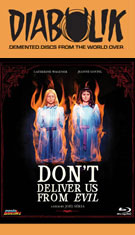
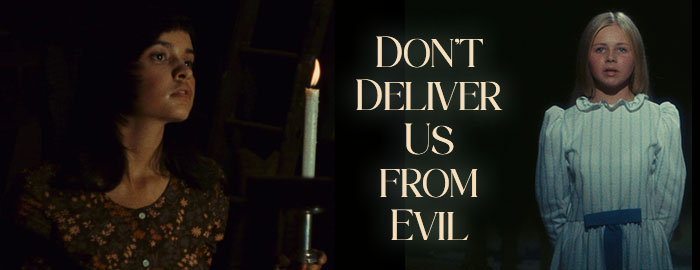
Color, 1971, 102 mins. 9 secs.
Directed by JoŰl SÚria
Starring Jeanne Goupil, Catherine Wagener, Bernard Dhéran, Gérard Darrieu, Marc Dudicourt, Michel Robin, Victor Davis
Mondo Macabro (Blu-ray & DVD) (US R0 HD/NTSC), Éditions Montparnasse (Blu-ray & DVD) (France R0 HD/PAL), Alive (DVD) (Germany R0 PAL) / WS (1.66:1) (16:9)
In an idyllic rural French village, convent 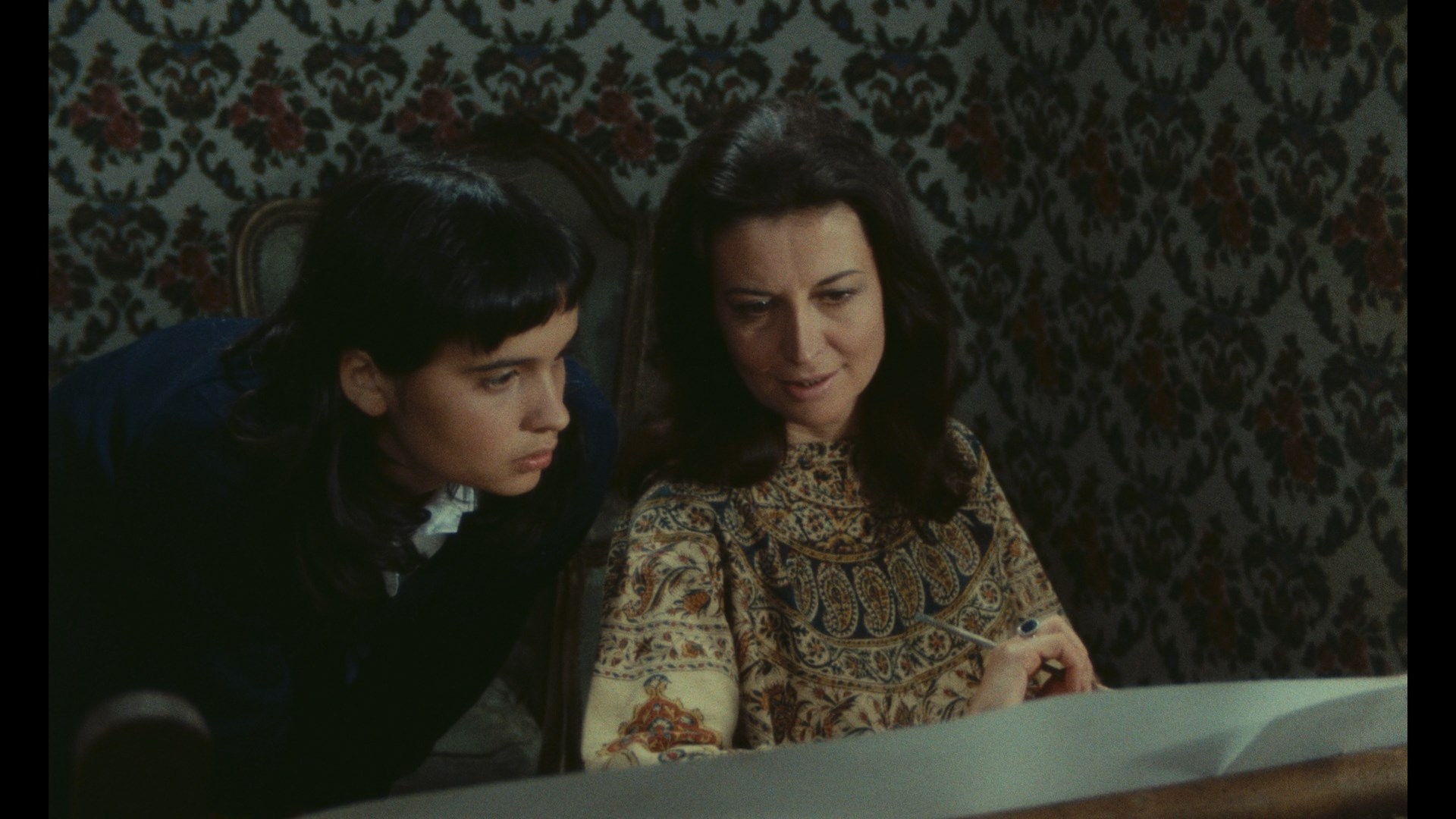 girls Anne (Goupil) and Lore (Wagener) find
girls Anne (Goupil) and Lore (Wagener) find 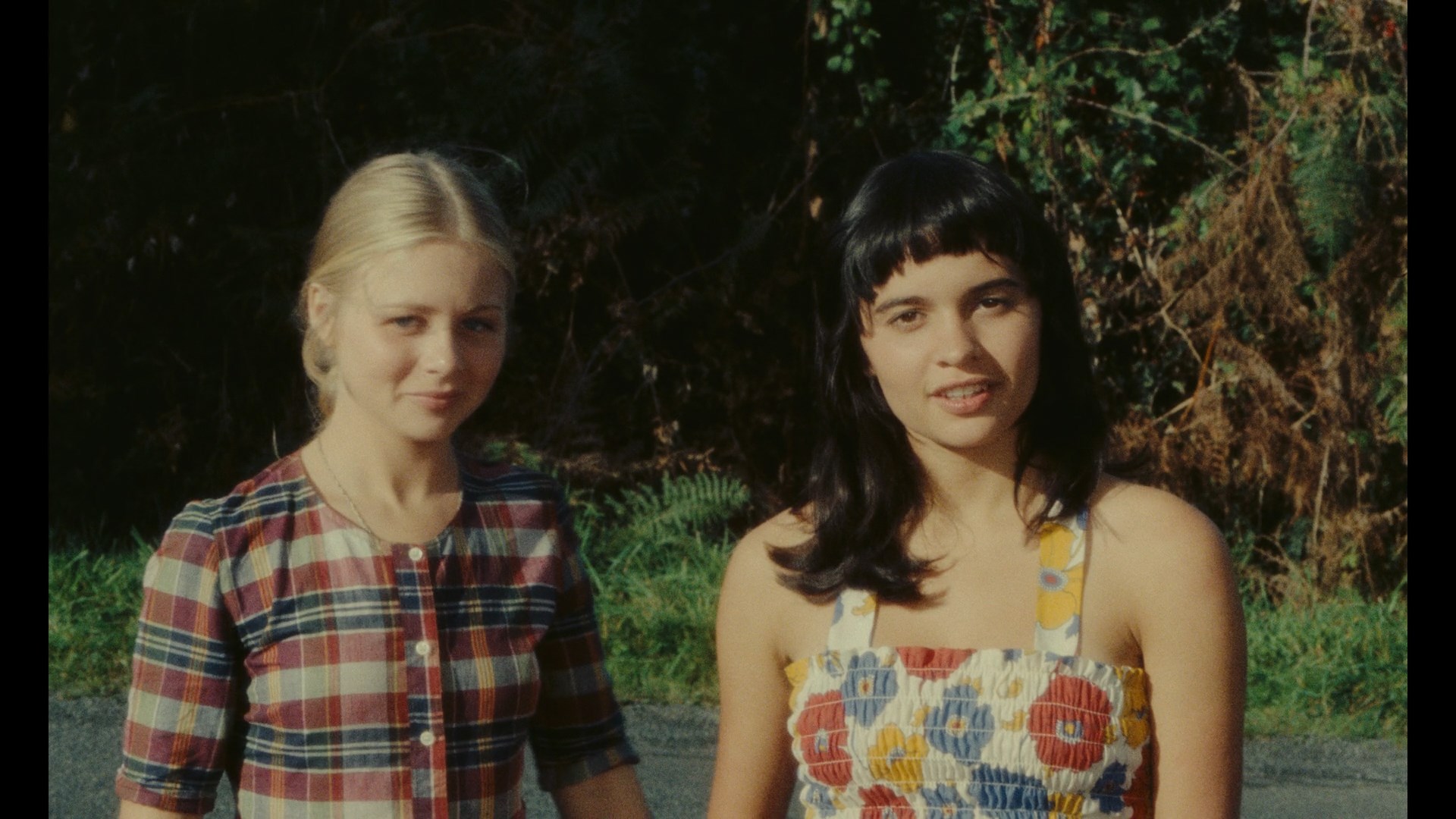 themselves gravitating to the more sinful side of things, such as imagining their didactic priest naked while yelling from the pulpit. Though they spend most of their public time bicycling around the country roads and looking like sweet young things, their internal corruption blossoms under each other's influence as they read naughty books under the covers at night, steal an occasional smoke and a nip of booze, pilfer chalices from the church's communion closet, and partake in random acts of cruelty, such as inflicting violence on the mentally challenged handyman's pet birds. Swearing eternal love to each other, the girls dabble with each other's sexuality while flaunting their physical charms, nearly getting molested in the process.
themselves gravitating to the more sinful side of things, such as imagining their didactic priest naked while yelling from the pulpit. Though they spend most of their public time bicycling around the country roads and looking like sweet young things, their internal corruption blossoms under each other's influence as they read naughty books under the covers at night, steal an occasional smoke and a nip of booze, pilfer chalices from the church's communion closet, and partake in random acts of cruelty, such as inflicting violence on the mentally challenged handyman's pet birds. Swearing eternal love to each other, the girls dabble with each other's sexuality while flaunting their physical charms, nearly getting molested in the process.
Advertised as "the French film banned in France" during its British theatrical run, the perverse gem Don't Deliver Us from Evil (Mais ne nous délivrez pas du mal) earned the censor's wrath over its blasphemous activity rather than its salacious content, which is pretty restrained. Apart from some brief topless nudity (and the mercifully faked bird-abuse scenes), there isn't much here that would have the anti-sex and violence crowd fuming. Instead, the full shock value comes from the sheer transgressive nature of the film's philosophy; it's not hard to see how the powers that be could fear "moral" damage being inflicted here, and not surprisingly, times have changed little in the ensuing decades. It's far more jolting to hear actresses casually uttering the most jaw-dropping blasphemies with utter conviction, compared 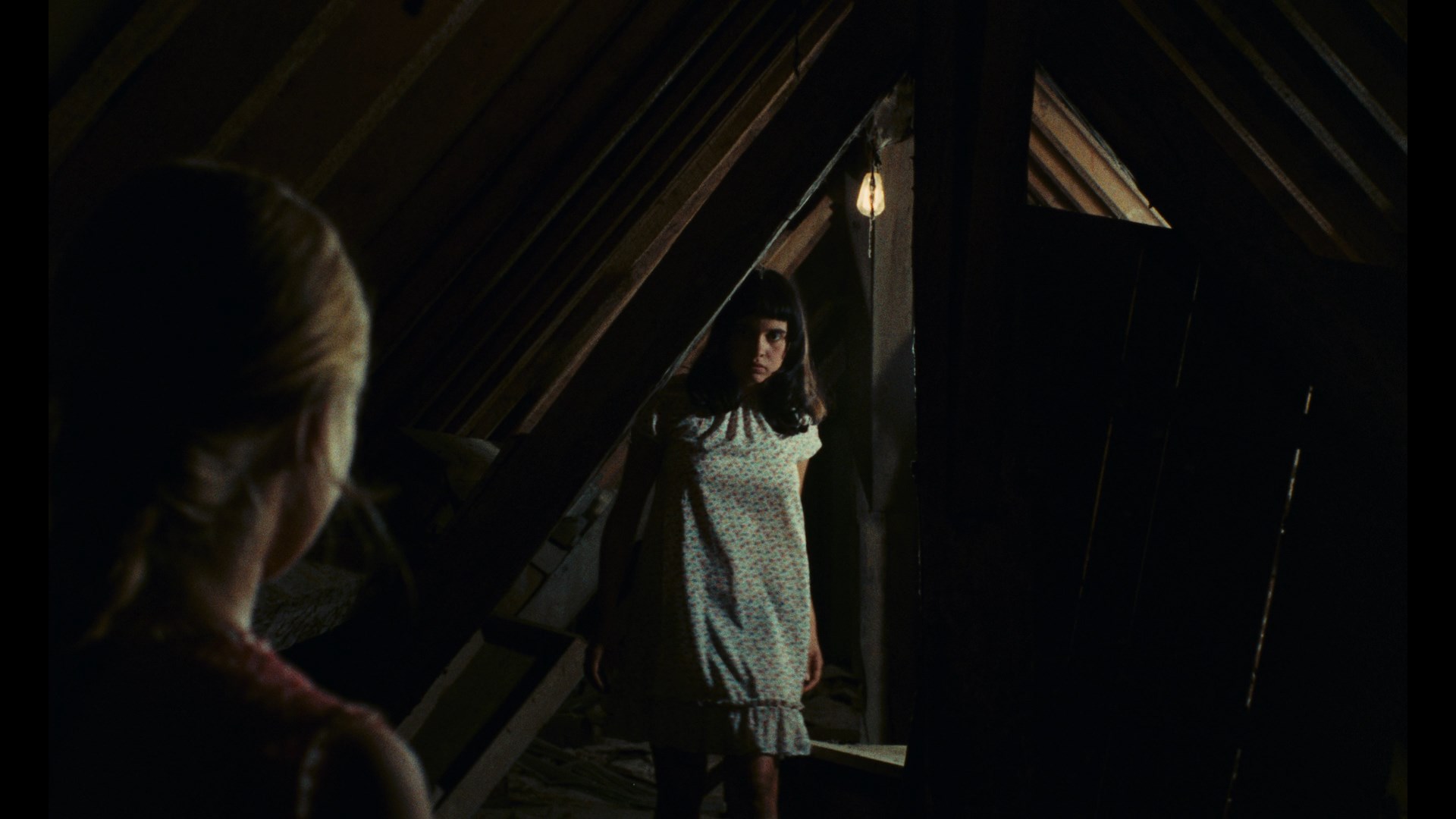 to the relatively mainstream bloodletting and nudity one expects from exploitation fare. Skillfully shot and
to the relatively mainstream bloodletting and nudity one expects from exploitation fare. Skillfully shot and 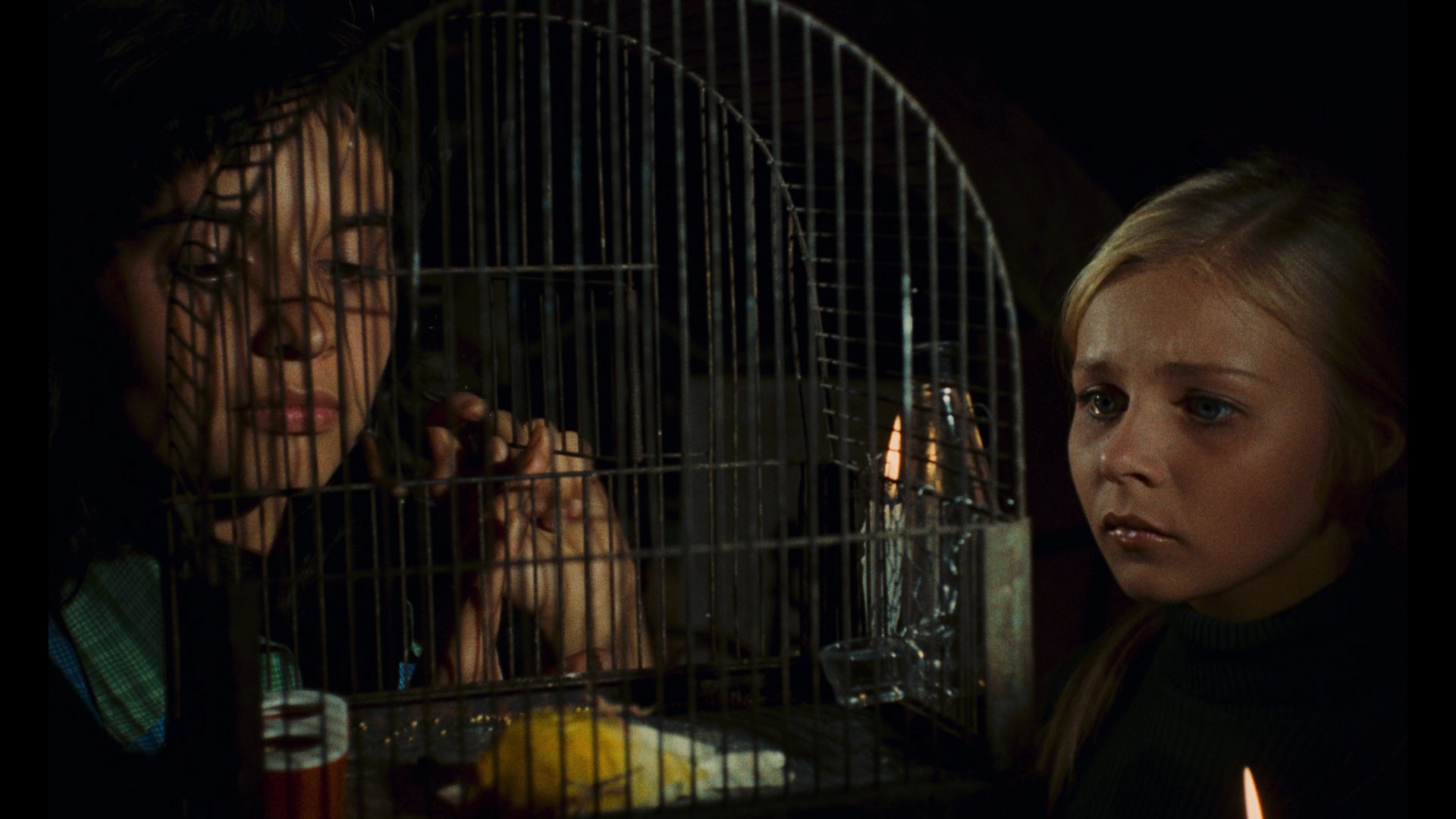 acted with a sparse and haunting music score, this film is definitely a class act in technical terms and could probably pass for a contemporary title from the likes of Claude Chabrol; however, its message is another matter altogether. What really sets this film apart is the literally show-stopping finale, a knockout flourish that sends viewers out with their jaws firmly planted on the floor. Taking the concept of performance art to the most radical extreme imaginable, it's poetic, beautiful, shocking, and darkly hilarious; fortunately, these qualities can be applied to the rest of the film as well if one approaches with a receptive attitude.
acted with a sparse and haunting music score, this film is definitely a class act in technical terms and could probably pass for a contemporary title from the likes of Claude Chabrol; however, its message is another matter altogether. What really sets this film apart is the literally show-stopping finale, a knockout flourish that sends viewers out with their jaws firmly planted on the floor. Taking the concept of performance art to the most radical extreme imaginable, it's poetic, beautiful, shocking, and darkly hilarious; fortunately, these qualities can be applied to the rest of the film as well if one approaches with a receptive attitude.
Amazingly, Don't Deliver Us from Evil was the first film for director JoŰl SÚria whose subsequent output is quite a bit less brazen than this one. The film was circulated in other territories and on home video in truncated editions, with Mondo Macabro's sensational DVD released in 2006 trumpeted as the first complete video edition anywhere. It's impossible to pinpoint the restored footage without any other English versions for comparison, but one can guess the dialogue passages that must have had sensitive censors reeling. The film itself looks marvelous for the most part, with minimal print damage. (Oddly, the only distracting avalanche of debris occurs during a black-out and could have easily been erased!) The French dialogue is presented in mono, with nice, very legible English subtitles.
As usual, Mondo Macabro cultivated an interesting set of extras from the film's native country to provide some much-needed context. SÚria turns up for an interview, "Settling the Score" (15m23s), in which he discusses the making of the film, his intended message, and the various censorship and distribution 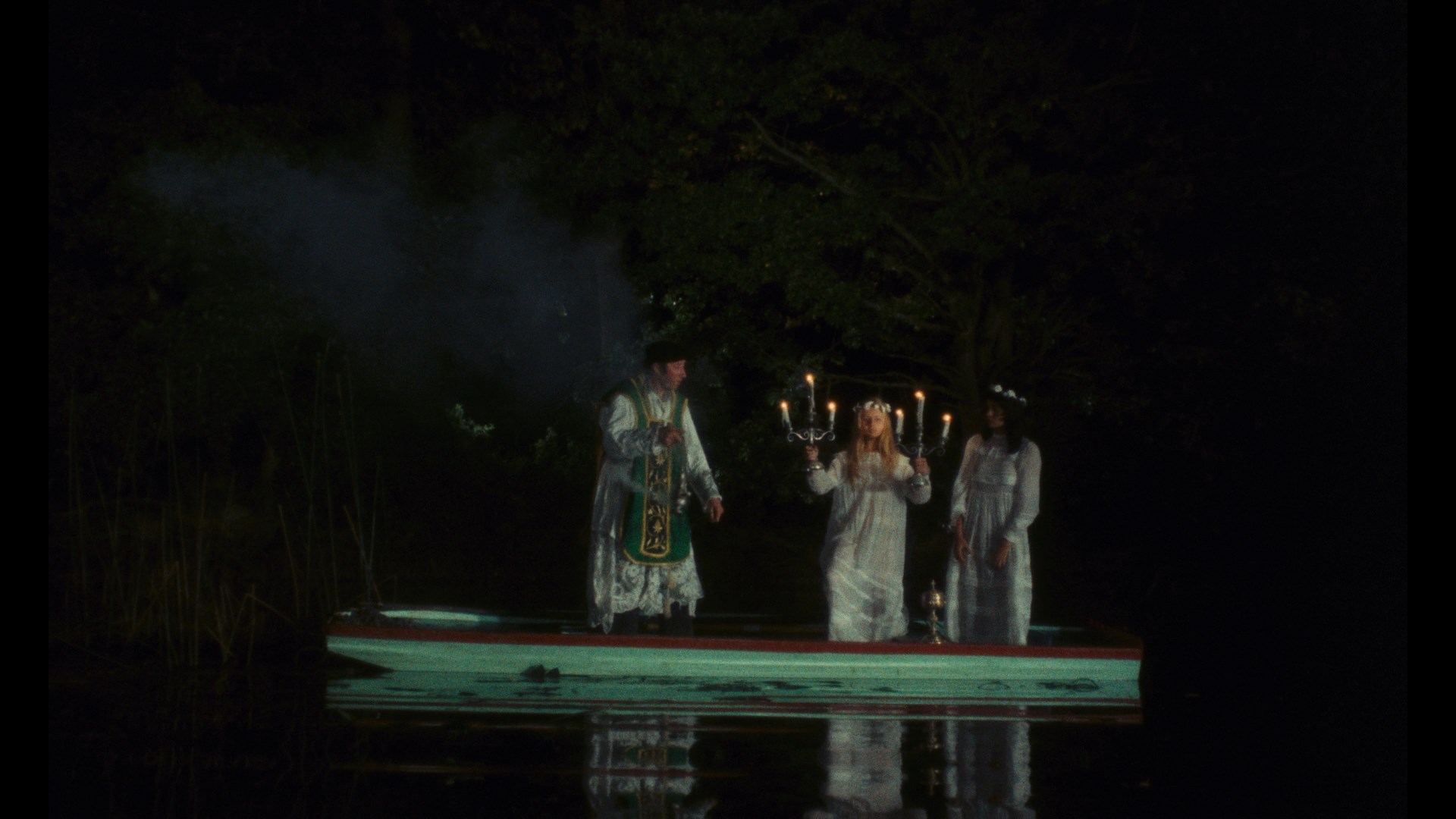 wrangles encountered upon its release, while the dark-haired Goupil contributes a solid interview, "The Devil's Advocate" (11m48s), in which she recounts her own lack of acting experience compared to her co-star, her approach to the role, and
wrangles encountered upon its release, while the dark-haired Goupil contributes a solid interview, "The Devil's Advocate" (11m48s), in which she recounts her own lack of acting experience compared to her co-star, her approach to the role, and 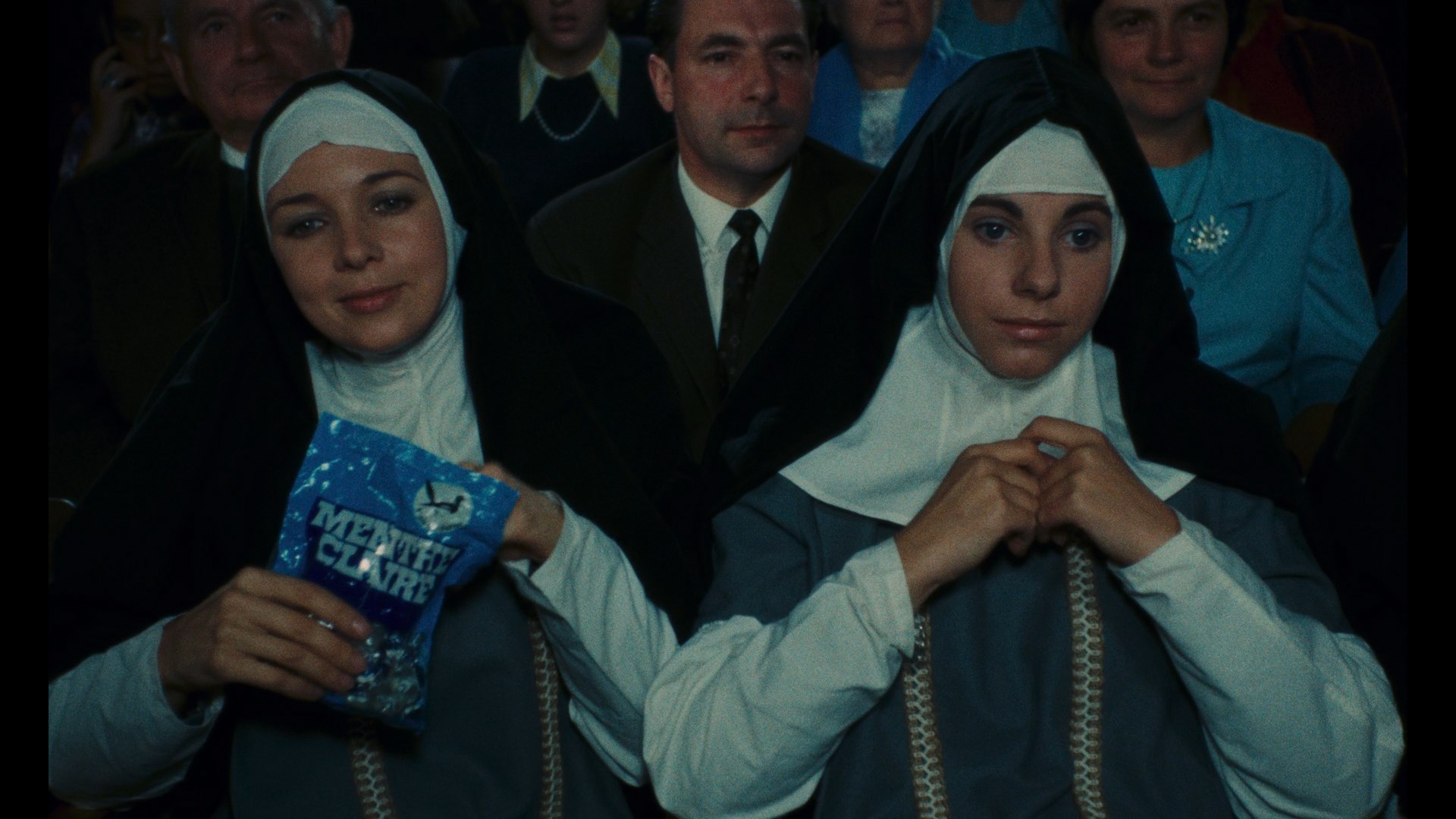 her feelings now about the film in question. A third featurette with Paul Buck, "Hellish Creatures" (12m3s), covers the film's very loose historical inspiration, the notorious Pauline Parker/Juliet Hulme murder which also formed the basis of Peter Jackson's far more faithful Heavenly Creatures. In fact, the connection between the true story and this film is so slim one simply has to take it on faith that the director had it in mind. Other extras include an "About the Film" essay, bios, an art gallery, and the usual old Mondo Macabro preview reel.
her feelings now about the film in question. A third featurette with Paul Buck, "Hellish Creatures" (12m3s), covers the film's very loose historical inspiration, the notorious Pauline Parker/Juliet Hulme murder which also formed the basis of Peter Jackson's far more faithful Heavenly Creatures. In fact, the connection between the true story and this film is so slim one simply has to take it on faith that the director had it in mind. Other extras include an "About the Film" essay, bios, an art gallery, and the usual old Mondo Macabro preview reel.
In 2022, Mondo Macabro upgraded the film to Blu-ray as a limited red-case edition with a general retail version in early 2023. Taken from a new 4K restoration from the original negative, it looks as superb as expected with a significant uptick in detail and fine film grain texture throughout. The color timing is generally close to the earlier transfer, though greens are richer and the outdoor scenes have a slightly more golden cast. The DTS-HD MA French 2.0 mono track sounds excellent throughout and features optional English subtitles. The three archival featurettes from the DVD are ported over here, while Kat Ellinger provides a new audio commentary chatting about the film as an example of transgressive cinema, the history of female sexuality in French cinema, and the creation of cinematic dream spaces. A new interview with Séria (21m57s) goes into a bit more depth about the background of the film including his own background with religious education, the development of the storyline, the issues with casting the main roles (largely due to disapproving parents), the scenes that causing censorship issues compared to its positive critical reaction in many quarters, and-- believe it or not-- his plans to make a sequel!
Updated review on January 20, 2023





 girls Anne (Goupil) and Lore (Wagener) find
girls Anne (Goupil) and Lore (Wagener) find  themselves gravitating to the more sinful side of things, such as imagining their didactic priest naked while yelling from the pulpit. Though they spend most of their public time bicycling around the country roads and looking like sweet young things, their internal corruption blossoms under each other's influence as they read naughty books under the covers at night, steal an occasional smoke and a nip of booze, pilfer chalices from the church's communion closet, and partake in random acts of cruelty, such as inflicting violence on the mentally challenged handyman's pet birds. Swearing eternal love to each other, the girls dabble with each other's sexuality while flaunting their physical charms, nearly getting molested in the process.
themselves gravitating to the more sinful side of things, such as imagining their didactic priest naked while yelling from the pulpit. Though they spend most of their public time bicycling around the country roads and looking like sweet young things, their internal corruption blossoms under each other's influence as they read naughty books under the covers at night, steal an occasional smoke and a nip of booze, pilfer chalices from the church's communion closet, and partake in random acts of cruelty, such as inflicting violence on the mentally challenged handyman's pet birds. Swearing eternal love to each other, the girls dabble with each other's sexuality while flaunting their physical charms, nearly getting molested in the process.
 to the relatively mainstream bloodletting and nudity one expects from exploitation fare. Skillfully shot and
to the relatively mainstream bloodletting and nudity one expects from exploitation fare. Skillfully shot and  acted with a sparse and haunting music score, this film is definitely a class act in technical terms and could probably pass for a contemporary title from the likes of Claude Chabrol; however, its message is another matter altogether. What really sets this film apart is the literally show-stopping finale, a knockout flourish that sends viewers out with their jaws firmly planted on the floor. Taking the concept of performance art to the most radical extreme imaginable, it's poetic, beautiful, shocking, and darkly hilarious; fortunately, these qualities can be applied to the rest of the film as well if one approaches with a receptive attitude.
acted with a sparse and haunting music score, this film is definitely a class act in technical terms and could probably pass for a contemporary title from the likes of Claude Chabrol; however, its message is another matter altogether. What really sets this film apart is the literally show-stopping finale, a knockout flourish that sends viewers out with their jaws firmly planted on the floor. Taking the concept of performance art to the most radical extreme imaginable, it's poetic, beautiful, shocking, and darkly hilarious; fortunately, these qualities can be applied to the rest of the film as well if one approaches with a receptive attitude.
 wrangles encountered upon its release, while the dark-haired Goupil contributes a solid interview, "The Devil's Advocate" (11m48s), in which she recounts her own lack of acting experience compared to her co-star, her approach to the role, and
wrangles encountered upon its release, while the dark-haired Goupil contributes a solid interview, "The Devil's Advocate" (11m48s), in which she recounts her own lack of acting experience compared to her co-star, her approach to the role, and  her feelings now about the film in question. A third featurette with Paul Buck, "Hellish Creatures" (12m3s), covers the film's very loose historical inspiration, the notorious Pauline Parker/Juliet Hulme murder which also formed the basis of Peter Jackson's far more faithful Heavenly Creatures. In fact, the connection between the true story and this film is so slim one simply has to take it on faith that the director had it in mind. Other extras include an "About the Film" essay, bios, an art gallery, and the usual old Mondo Macabro preview reel.
her feelings now about the film in question. A third featurette with Paul Buck, "Hellish Creatures" (12m3s), covers the film's very loose historical inspiration, the notorious Pauline Parker/Juliet Hulme murder which also formed the basis of Peter Jackson's far more faithful Heavenly Creatures. In fact, the connection between the true story and this film is so slim one simply has to take it on faith that the director had it in mind. Other extras include an "About the Film" essay, bios, an art gallery, and the usual old Mondo Macabro preview reel.![]()